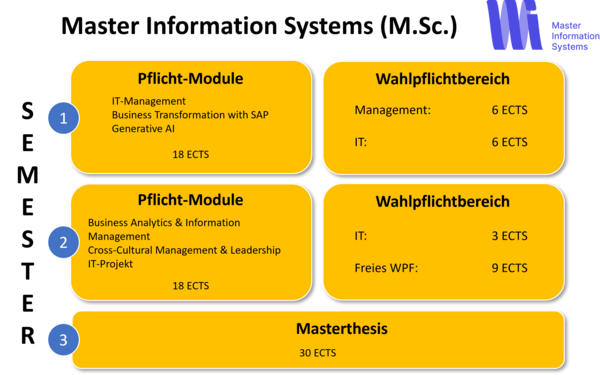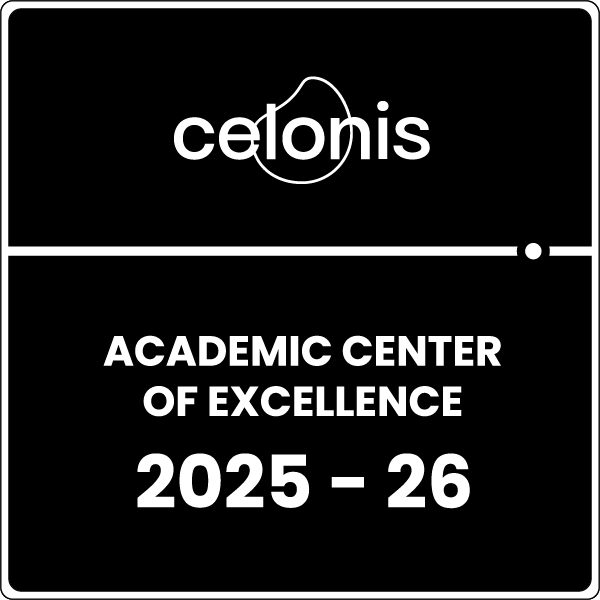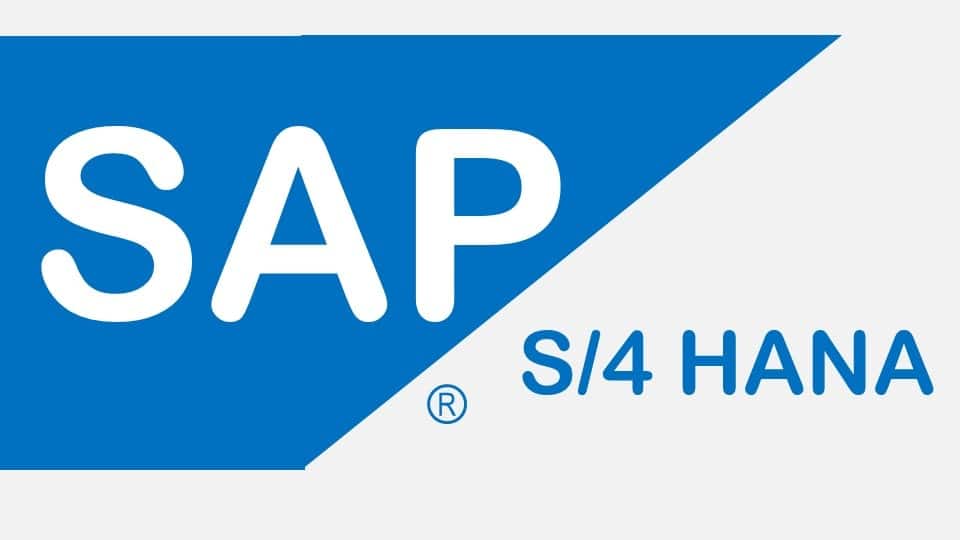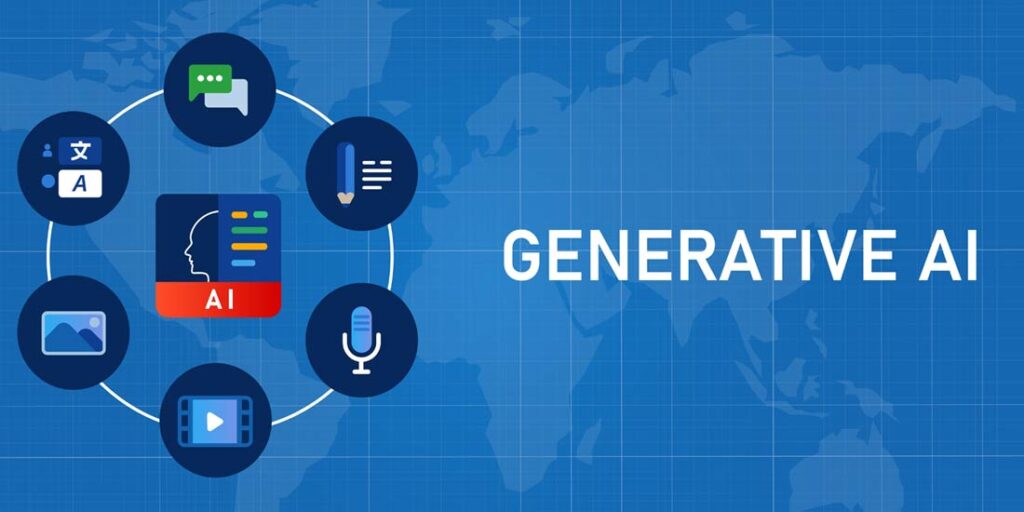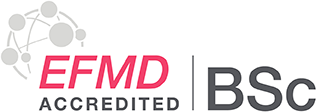The MIS study model consists of a combination of content from the fields of business informatics and applied computer science, combined with application-oriented topics / organisational functions and general management.
The courses offered are geared towards current developments in IT technology. Lecturers from various disciplines provide you with in-depth specialist knowledge and interdisciplinary connections within the field of information systems.
The advantages of studying MIS
Together with domestic and international students, you will develop solutions to business-related issues. In the courses, lecturers with practical experience will also pass on their knowledge to you. The university's business contacts in general, and those of our undergraduate programmes in particular, are an excellent addition to the programme and are reflected in diverse, interesting, challenging and, above all, current practical projects. The M.Sc. Information Systems takes the latest developments in the IT sector into account: the course content is tailored to current IT technological and market-relevant innovations and imparts the associated technical and methodological expertise.
Many colleagues from the programme are active in the field of applied research. The MIS is also affiliated with the doctoral programme at Pforzheim University. In addition to the range of English-language subjects on offer, you will also benefit from a wide range of opportunities to spend a semester abroad at one of Pforzheim University's partner universities.
Threefold award: Pforzheim University is a Celonis Academic Centre of Excellence
Pforzheim University has once again been named a Celonis Academic Centre of Excellence – for the fourth time in a row. This places it among the top international universities that are leaders in teaching, research and the application of process mining.
The award recognises our ongoing commitment to inspiring and educating students in future-oriented topics such as digital business processes, data analytics and process automation. At the Faculty of Economics and Law, more than 1,300 students per year are now familiarised with the Celonis platform in nine modules at bachelor’s and master’s level.
Through interdisciplinary teaching concepts, international research collaborations and innovative practical projects with industry partners, we are actively shaping the future of digital process management – and opening up excellent career opportunities for our students in a rapidly growing professional field.
More information about the award and the Celonis Academic Alliance:
View certificate: credly.com
Further information about the Celonis Academic Alliance: www.celonis.com/academic-alliance
Practical learning with SAP
SAP plays a central role in the Master's program in Information Systems. Students acquire practical knowledge in the application, configuration, and integration of modern SAP systems that are used in companies worldwide.
Within modules such as Business Transformation with SAP Business Analytics & Information Management, the following SAP technologies are used in particular:
- SAP S/4HANA – the leading ERP system for integrating business processes in finance, logistics, and supply chain management
- SAP Customizing – practical configuration of modules such as Finance (FI) and Materials Management (MM)
- SAP Analytics Cloud (SAC) – for business intelligence, data visualization, and forecasting models
- SAP Build Process Automation – for developing your own low-code applications and automating business processes
This content is supplemented by practice-oriented projects in which students simulate real business scenarios, analyze data in SAP, and digitally optimize processes.
This creates a close connection between theoretical knowledge and practical application. Ideal for preparing for careers in business practice and consulting. In addition, knowledge can be deepened through elective courses such as Enterprise Architecture Management, in which students gain insights into architectural principles and frameworks such as TOGAF.
Graduates of the Master's program in Information Systems are excellently prepared for positions in the SAP world, for example as:
- SAP Consultant (S/4HANA, Finance, Logistics & Supply Chain Management)
- Business Analyst or Solution Architect
- Data & Analytics Specialist (SAC)
- Process Automation Expert (SAP Build)
- IT Project Manager or Digital Transformation Lead
With its clear focus on SAP technologies, process management, and data analysis, the program optimally prepares students for leading roles in the digital economy.
“Explore how digital transformation shapes modern enterprises in the SAP module of the MIS master’s program at Pforzheim University. By working hands-on with SAP S/4HANA and the low-code SAP Build platform, you’ll learn to automate and optimize business processes for a career at the forefront of digital innovation."
Prof. Dr. rer. pol. Frank Morelli
Generative AI – Innovation and creativity reimagined
The Master's program in Information Systems (M.Sc.) teaches cutting-edge skills in the field of artificial intelligence (AI) – from technical development and creative applications to the responsible design of human-centered systems.
With the new module ‘Artificial Intelligence in Business’, Pforzheim University offers students the opportunity to understand the potential of generative and interactive AI approaches in a practical way and to reflect on them critically.
The focus is on the two topics of Generative AI and Human-Centered AI Interface Design, which combine technological innovation with design thinking, ethics, and strategic application. Students learn to understand modern AI models, apply them in practice, and at the same time evaluate their social and legal implications in a well-founded manner.
The module covers current topics such as:
- Structure, functioning, and application of generative AI models
- Use of large language models (LLMs) for text, code, and image generation
- Integration of AI into business processes and corporate strategies
- Examination of the suitability of AI tools for the development of user-centered interfaces
- Analysis of ergonomic, ethical, and legal aspects of AI application
- Reflection on bias, data protection, copyright, and accessibility
- Use of modern tools such as ChatGPT, Midjourney, Miro AI, Uizard, or Canva AI for idea development and evaluation
Through interactive teaching formats, case studies, and hands-on projects in the AI Lab, students apply their knowledge directly. They examine the practical benefits of AI in interface design, develop AI-supported prototypes, and reflect on their potential and limitations in an economic and social context.
The module combines technological depth with critical analysis:
Students not only gain an understanding of how generative models work, but also the ability to evaluate the use of AI in the design process from a human-centered perspective.
This creates a future-oriented perspective in which technology and people are consciously brought into harmony.
The module combines scientific foundations with practical work. Students write scientific papers, give presentations, and implement their own projects.
This results in a deeper understanding of how AI can be used responsibly, efficiently and creatively to drive innovation in organizations.
Internationally and nationally accredited teaching quality
The high quality of our teaching is confirmed by AACSB and AQAS accreditations and, last but not least, by the job market.
AACSB
As part of the Faculty of Economics and Law at Pforzheim University, the MIS programme meets the highest global standards. This is certified by the world's leading accreditation institution, the Association to Advance Collegiate Schools of Business (AACSB). The international accreditation label is considered one of the most prestigious awards and is an international confirmation of outstanding quality in university education in economics. Pforzheim University is thus one of currently 10 AACSB-accredited universities in German-speaking countries. It is the second university in Baden-Württemberg and the first university of applied sciences in Germany whose high quality in teaching and applied research has been confirmed by AACSB.
AQAS
The Master of Science in Information Systems is accredited by the Agency for Quality Assurance through Accreditation of Study Programmes (AQAS) in Bonn. The following excerpt from the previous accreditation report confirms the high quality of teaching and the unique positioning of the programme concept: ‘The close connection between business, technology and management is a unique selling point that is of great interest to both applicants and industry and administration. Graduates are offered realistic opportunities on the job market. The mix of foreign and German students, German- and English-language courses, and theory and practice is particularly positive.’
International university relations
International university relations
Pforzheim University has the highest proportion of international students in Germany, has extensive academic relationships with universities and organisations around the world, and cooperates with internationally renowned companies.
Our course content has an international focus right from the start. This internationality is ensured by:
- the focus of the course content
- the bilingual teaching concept (German/English)
- the composition of the student group
- cooperation with international partner universities
Examples of cooperation with international universities: Joint case study work with student project teams from Chico State University in California and the Canadian University HEC Montreal as part of the English-language course ‘Business Process Management’.
Projects provide early training in project management and social skills. The project teams consist of students from different countries. This allows students to intensify their language skills and gain early experience in working with people from other cultures.
Of course, our students also have the opportunity to attend a foreign partner university as part of a voluntary semester abroad in combination with a ‘Learning Agreement’. You can find more information on this on the pages of our International Office.











